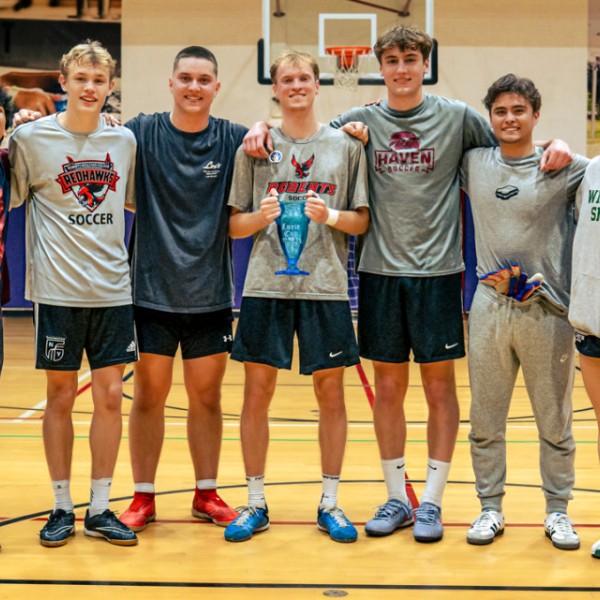As the Cornell Humphrey Fellowship graduate assistant, I view each Fellow as a Rockstar. Hand-picked by the Department of State, they are mid-career professionals who attend year-long leadership and skills training at one of thirteen campuses, including Cornell. They are also my de facto mentors and teachers. As I show them the ropes of taking classes, Cornell networking, and personalizing their fellowships, they open my eyes to realities beyond my international development grad school classroom.
Unfortunately, this group of 14 Fellows from 13 countries has had a trying and abridged year. However, I dare say they, along with our management team, Peter Gregory, Polly Holmberg, and myself, developed grit and community in ways that will last long after the pandemic.
None of us knew which curveballs we would face. The normally ten-month fellowship was condensed to a five-month spring semester. Five Fellows relocated from UC-Davis at the last minute. The Cornell COVID-19 Response Team did not have us in their system. Plus, we had to obtain rigorous university COVID-19 approvals for each in-person activity.
Yet we adapted through this process. On Zoom, we realized untapped possibilities to become hybrid professionals. For example, Safras Safwan of Sri Lanka learned to manage his workforce of 10,000 remotely by collaborating with Cornell’s Workday director. Furthermore, our program solidified our national network as we joined other Humphrey campuses to host multi-campus seminars that met fellows’ diverse needs.
We also grew communally. Since the fellows had traveled across the world to be at Cornell, I did my best, as the Humphrey Fellows’ “party planner,” to organize safe, socially distanced activities. Imagine watching a 45-year-old experiencing snow for the first time…on a sled or skis! Or hiking with a group of confused adults as they follow their phone’s clues to a tree, feeling around for a geocache. These activities helped meld the Fellows into friends and colleagues when community-making was difficult elsewhere. Moreover, by being confined locally, we came to appreciate many of New York’s wonders, like Niagara Falls, Cornell AgriTech in Geneva, and Letchworth State Park, the “Grand Canyon of the East.”



The 2020-21 Cornell Humphrey Fellows cohort includes 14 mid-career professionals from 13 countries.
Francine Barchett is the Cornell Humphrey Program’s longest serving graduate assistant and transitioned from a masters to a PhD program in May 2021.
Humphrey Fellows Mohsin Khan and Husnain Afzal (both from Pakistan) enjoy an afternoon of cross country skiing at the Cornell golf course.
Finally, we learned to discern what can be done on a computer versus what is irreplaceably in-person. Montezuma National Wildlife Refuge in Seneca Falls has an invasive species problem that shows no signs of abatement. As our keystone volunteer activity, we literally put our hands together to remove common buckthorn. Zoom and telecommunication, we also realized, is still a luxury for many. By visiting the Broome County farming community, Fellows’ gleaned insights to take home to their countries.
A lot of people ask why the Humphrey Fellowship even had a program this spring when Cornell and the US had all but shut down. While this was a federal government decision outside of our hands, I believe we made the most of what we had.
For our final teambuilding activity as things were opening up in May, we all went whitewater rafting. Afterward, I turned toward Safras and Mohsin Khan from Pakistan. “So, what do you think?” Mohsin snickered, then grinned. “I think this is the best day of the fellowship. For better or worse, this year makes us a family.”
Humphrey Fellows are my mentors, but also teachers for life.
Mohsin Khan, Agricultural Extension and Food Security Worker, Pakistan
"Being at Cornell was full of enjoyable moments and wonderful learnings but most mesmerizing was the beautiful landscape and building structures.
Through this fellowship, I learned best community service and rural development models implemented across the US and New York State. Now, I hope to replicate them in the Pakistani context by working with community-based organizations in rural areas. This exchange of knowledge can provide a chance to design a locally suitable model to address local challenges."
Husnain Afzal, Executive Engineer (Civil), Water & Power Development Authority, Pakistan
"I had the most amazing time at Cornell; starting with academics, the faculty is highly professional, cooperative, and outstanding. I loved walking around the campus’s architecturally magnificent buildings, scenic waterfalls, botanical gardens, and—not to forget—snow skiing.
Studying at Cornell broadened my vision and expanded my mind to think more creatively. In particular, I learned about sustainable water resource management in the face of climate change. I hope to apply lessons learned to assess existing and future water demands across various sectors, including to inform decision making for water and power infrastructure development and its financial implications, promote water re-use, quantify climate-change driven impacts on water resource availability, and build capacity among Pakistani water resource managers."
Safras Safwan, District Director, Department of Development, Ministry of Finance, Sri Lanka
"I was really surprised about the role Cornell played as both a private and public land grant university and its contribution to the economy through its world class education and advanced research facilities and innovations.
I was able to customize my Humphrey fellowship on the theme of “Promoting Agricultural Technology and Best Practices to Increase Productivity and Modernize Agriculture through Diversification, Commercialization and Value Addition.” I hope what I learned will help me develop Sri Lanka’s agriculture sector to alleviate poverty and meet the UN Sustainable Development Goal #2 of zero hunger by 2030."
Manoj Kaphle, Senior Credit Officer, Agricultural Development Bank, Nepal
"I found this program to be a milestone for my professional development. I think I achieved almost all the fellowship goals I had made.
My words are less than enough to describe my friendship partners, professors, and Cornell Humphrey cohort as they supported me from the very beginning to the end of my fellowship. I enjoyed visiting several places in New York State, tasting different foods, and having new experiences like playing snow games.
During the fellowship, I connected with two other Humphrey Fellows from Nepal who were placed at Massachusetts Institute of Technology (MIT) and Syracuse University campuses. We are in the beginning stages of a rural livelihood improvement project that will tentatively be based in a village of Nepal. Strengthening farmer capacity, building essential infrastructure to enhance production and create market access, and finance and technical services will be the major outputs of this project."
A version of this article originally appeared in the Cornell South Asia Program 2021 Bulletin.
Keep Exploring

News
Rohan Amin's Lurie Cup soccer tournament brings people together from Cornell and around New York state to support the pediatric hospital that saved his life.
- Global Development

News
Communities tracked by AARP's Livability Index made progress becoming more age friendly, but housing affordability and health care access remain challenges.
- Global Development

We openly share valuable knowledge.
Sign up for more insights, discoveries and solutions.


